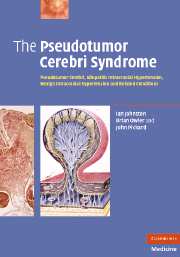 The Pseudotumor Cerebri Syndrome
The Pseudotumor Cerebri Syndrome Book contents
9 - Outcome
Published online by Cambridge University Press: 21 August 2009
Summary
Introduction
Whilst this subject has, in part, been considered in the previous chapter on treatment, there are several aspects pertaining to outcome which merit separate and particular consideration. These aspects, which include duration of symptoms, the outcome for visual function, the likelihood of recurrence, psychological sequelae and the development of other diseases (this last incorporating the risk of error in the initial diagnosis), will be addressed in turn in the present chapter. In each instance the data from the Glasgow and Sydney series will be given, followed by a review of the relevant literature.
Duration of symptoms and signs
In Table 9.1 the patients in the Glasgow series are divided according to whether an aetiological factor was identified or not. In neither group did symptoms persist for long after the start of treatment in the majority of cases. Thus, in 83 of the 99 patients (83.8%) initially complaining of headache and 69 of the 88 patients (78.4%) with visual symptoms at the time of presentation, symptoms had cleared within 3 months of starting treatment. Headaches persisted longer than 12 months in only seven patients (7.1%), and visual symptoms in only 10 patients (11.4%). The duration of papilloedema tended to be longer, however, persisting for between 4 and 12 months in 38 of 92 patients (41.3%), and for longer than 12 months in 14 of 92 patients (15.2%).
- Type
- Chapter
- Information
- The Pseudotumor Cerebri SyndromePseudotumor Cerebri, Idiopathic Intracranial Hypertension, Benign Intracranial Hypertension and Related Conditions, pp. 232 - 245Publisher: Cambridge University PressPrint publication year: 2007


